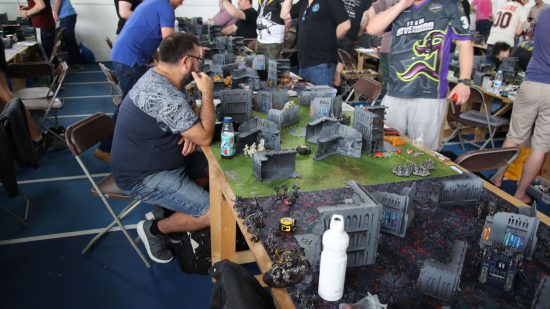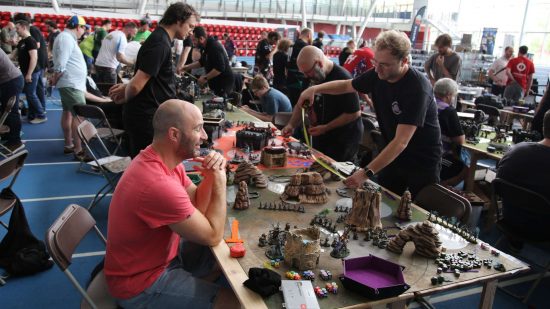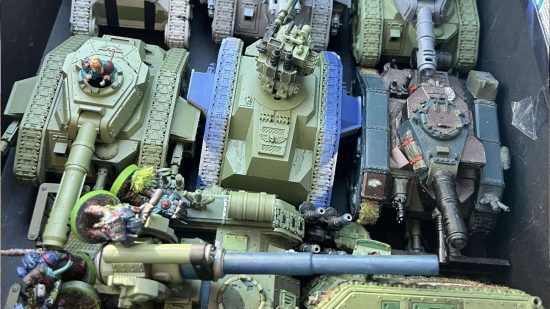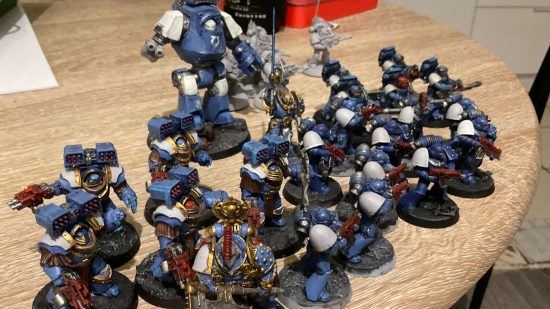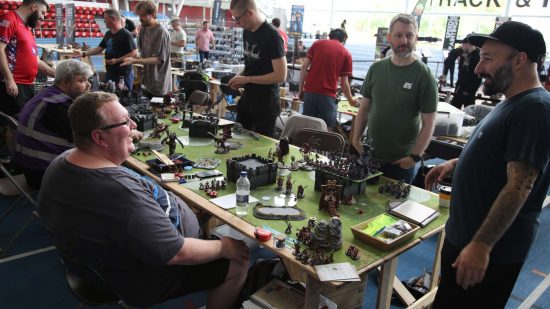Travis Miller’s post to the r/WarhammerCompetitive subreddit begins: “I am sitting in the hospital currently, and I am paralyzed from the waist down”. Recently disabled, millsssy’s post on November 15 asks for advice about how to play competitive Warhammer 40k while using a wheelchair.
Responses from disabled people and their families paint a mixed picture: Warhammer 40k tournaments may not be designed with accessibility in mind, but the organizers and players who go are (almost) universally eager to make accommodations when asked.
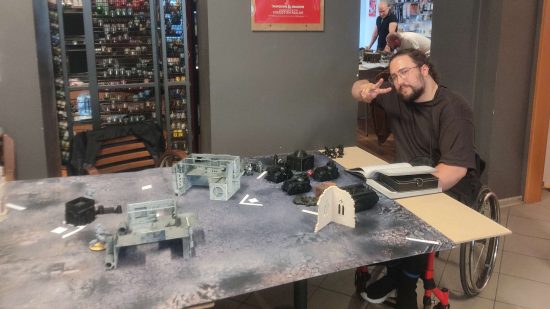
The reddit thread provides practical suggestions for gamers with disabilities, from useful accessories, to easy-to-move Warhammer 40k factions. There’s also valuable information that able-bodied people can use to make their gaming spaces and events more inclusive. Several contributors were happy for Wargamer to summarise their input – here’s what they had to say.
What makes Warhammer 40k tournaments accessible?
Redditor woulditkillyoutolift says that his son “was in a wheelchair for much of the last two years”, and threw himself into competitive Kill Team. He and his family have seen a lot of gaming tournaments in that time, even competing at the World Championships of Warhammer. He says that “most places haven’t given much thought to accessibility” but that once they’re asked, “every single organizer was willing to help us navigate it”.
Others concur that it’s a good idea to check with the organizers before attending an event, as it may not be configured with the needs of wheelchair users or people with other mobility difficulties in mind. Talock86, who has a fused spine, chronic pain, and weakness in the left leg says: “If it’s an event with a TO I don’t know or a venue I am unfamiliar with I will reach out and talk to them”.
Tables need to be low for a wheelchair user to access them, and aisles between tables need to be wide to create room to move. That space will also accommodate people with other mobility disabilities who need to be able to sit. Seats are essential for Talock86, who says “the longer I stand and bend the greater my pain gets and my risk of falling”. Similarly, Mike from Toronto “can’t stand for more than 15-20 minutes”.
Despite space concerns, tournament venues can be more accessible than some local game stores. Filip, a wheelchair user from Poland, says “most game stores I’ve seen are really small, the layout is made with able people in mind”. Toilets that are too small for wheelchairs, second-storey stores without elevator access, and narrow shop aisles exclude wheelchair users.
In contrast, the “huge, mostly modern event buildings” that tournaments take place in often have elevators, accessible bathrooms, and large, open-plan rooms for gaming.
Reaching models while seated
It can be challenging to reach across a full 40k table from a seated position, even with the smaller board sizes used in Warhammer 40k 10th edition. Cramped venues make it difficult to navigate around a gaming table, particularly in a wheelchair.
The choice of game can mitigate this challenge. Filip says “smaller skirmish games, like Kill Team or Necromunda, are easy for me to play”. Woulditkillyoutolift says his son hasn’t had any difficulty reaching everything on a Kill Team board. But what if you want to play a big game like 40k, Age of Sigmar, or Horus Heresy?
The commenters in the thread have many positive stories about their opponent moving their models for them. Dawn Jones, who uses a wheelchair, says people are “open, accepting and accommodating: If I ask them to move models for me they will do”. Filip has started playing 10th edition 40k, and says asking for help moving minis is “never seen as a problem”. T, from the USA, says he has “nothing but good things to say about my experiences with wargaming with a spine injury”.
Some commenters recommend picking an army with a low model count. Shawn Kelly, a veteran from North Carolina who has a mobility disability as a result of a service injury, says: “I mostly play armored spearhead Imperial Guard mass tank lists”. Having few models means his “movement phase typically takes about three to four minutes max “.
Tools can help, too. Jones uses a “a dice tray to keep my dice from going everywhere”, and a “dice cup has been helpful when my hands are bad”. A laser pointer is useful “to indicate which way to move or where to place models”. She recommends the kind of pointer that projects a red line across the playing board to determine sight lines she’s not able to check herself: “it being a beam of light, there can be no argument with your opponent”.
Bad sports
Not everyone plays fair. Jones reports that “a very small minority of people I’ve met… take advantage of my condition”. Filip says that “With bigger events, the chances for encountering problematic players increase; sometimes people are so focused on winning that they forget empathy”. Both emphasise how rare it has been for them, and many other respondents had no bad encounters to report.
Jones has some practical recommendations to safeguard against cheating – they also make for good sportsmanship recommendations for all players.
“I’ve had people roll dice behind terrain and claim they got far more hits than they rolled – this was corroborated by a judge”, Jones says. To prevent this, “insist that dice are rolled clearly in front of you, ideally in a dice tray”.
Relying on opponents to move models and remove casualties gives unscrupulous the opportunity to hide information or preferentially remove valuable models from units hidden behind terrain. “I make a special effort to keep track of models going out of line of sight to try and prevent this”. She emphasises how important it is to “be very clear about which to take and which to leave unless you know the person you are playing well”.

Getting to tournaments
“You’ll need to spend a lot of time planning ahead on travel”, woulditkillyoutolift says, particularly if you’re going to an international event: “navigating airports in a wheelchair is a pain in the ass”. The Vice news documentary above shows some of the challenges facing wheelchair users when they fly, on top of ever gamer’s worry that their army will be wrecked in baggage handling.
Woulditkillyoutolift also recommends “a buddy to help you move your army” to the venue and to your table – he took on this role for his son. He’s a competitive Kill Team player who attends the same tournaments as his son, but not every assistant is going to be a gamer.
Tournaments can make it easier for people to support disabled friends by offering free spectator entry for assistants, whether or not they’re a registered carer, parent, or guardian.
It is still possible to go it alone. Filip doesn’t own a car, so “all I can carry is a big backpack I sling on the back of my wheelchair”. It adds an extra challenge to army building: “I can fit it in my list, but can I fit it in my backpack?” He says that “magnetic boxes and magnetising the bases of models” has been the most effective transport method so far, but he still has to make compromises in the lists he brings.
For him, the inconvenience is worth it. He says “the thing every disabled person wants (I think) is independence… as much as I appreciate help from other people, I’d still rather do it myself”.
Many of the issues that can make wargaming less accessible for disabled people extend beyond the scope of the hobby itself, from the provision of public transport, to the cost of medical care. Original poster Miller says in his first post that he “will have to sell my armies to help pay bills”.
But tournament organizers, and other gamers, can do their part to make the hobby more accessible to more people, simply by listening to disabled people and designing events, venues, and even games, with their needs in mind.
With thanks to everyone who responded to Wargamer’s questions for this article. Thanks to Filip the photo of him gaming in his FLGS and his Ultramarines, and Shawn Kelley for his tank company. Tournament shots come from the London Grand Tournament, and are intended to illustrate gaming tables with seating at an accessible height.
If you’re interested in accessibility in tabletop gaming, have a look at this article about Jennifer Kretchner’s ‘DnD for all’ toolkit, and how it aims to remove barriers to the hobby that able-bodied people may not realise are there.

